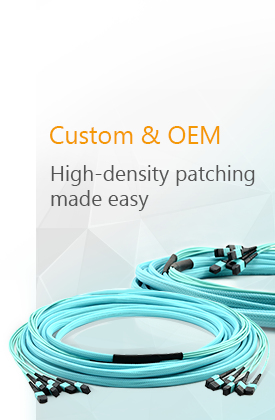In the ever-evolving world of optical communication, the role of fiber adapters is critical for ensuring reliable and efficient connectivity. A fiber adapter, also known as a fiber coupler, is a small but vital component that allows two fiber optic cables to be connected seamlessly. These devices are essential in a variety of applications, from telecommunications to data centers, providing the necessary link between cables to ensure uninterrupted data transmission. This article will explore the characteristics and uses of fiber adapters, highlighting their importance in modern optical networks.
Key Features of Fiber Adapters
-
High Compatibility Fiber adapters are designed to be highly compatible with various types of fiber optic connectors, including SC, LC, ST, and FC. This versatility makes them suitable for different network setups and requirements.
-
Low Insertion Loss One of the primary features of fiber adapters is their ability to maintain low insertion loss. This ensures minimal signal loss during the connection process, preserving the integrity and speed of data transmission.
-
Durability and Reliability Constructed from high-quality materials, fiber adapters offer excellent durability and reliability. They are designed to withstand various environmental conditions, ensuring consistent performance over time.
-
Simple Installation and Maintenance Fiber adapters are easy to install and maintain, making them a convenient choice for network engineers and technicians. Their design allows for quick and secure connections, reducing the time and effort required for network setup and maintenance.
-
Compact Design The compact design of fiber adapters allows them to be used in space-constrained environments. They can be easily integrated into patch panels, wall outlets, and other network equipment without requiring significant space.
Types of Fiber Adapters
-
Simplex and Duplex Adapters Simplex adapters are used for single fiber connections, while duplex adapters are designed for dual fiber connections. Duplex adapters are commonly used in applications where bi-directional communication is required.
-
Hybrid Adapters Hybrid adapters are versatile components that allow the connection of different types of fiber optic connectors. For example, a hybrid adapter can connect an SC connector to an LC connector, providing flexibility in network configurations.
-
Multi-Fiber Adapters These adapters are used to connect multi-fiber connectors, such as MPO/MTP connectors. They are essential in high-density network environments, such as data centers, where multiple fiber connections are needed.
Applications of Fiber Adapters
-
Telecommunications In telecommunications, fiber adapters play a crucial role in connecting different segments of the network. They ensure that signals can be transmitted over long distances without significant loss, supporting high-speed communication.
-
Data Centers Data centers rely heavily on fiber adapters to manage the vast number of fiber connections required for data transmission and storage. The use of fiber adapters helps to maintain organized and efficient network infrastructure.
-
Broadcasting The broadcasting industry uses fiber adapters to ensure the reliable transmission of high-definition video and audio signals. They are critical in linking various components of the broadcast network, from cameras to control rooms.
-
Military and Aerospace In military and aerospace applications, fiber adapters are used to provide secure and reliable communication links. Their durability and performance in harsh environments make them ideal for these demanding applications.
-
Medical In the medical field, fiber adapters are used in various diagnostic and imaging equipment. They ensure the precise transmission of data, which is crucial for accurate diagnostics and patient care.
Conclusion
Fiber adapters are indispensable components in modern optical networks, offering high compatibility, low insertion loss, durability, and ease of installation. Their applications span across various industries, including telecommunications, data centers, broadcasting, military, aerospace, and medical fields. As the demand for high-speed and reliable communication continues to grow, the role of fiber adapters in ensuring seamless connectivity becomes increasingly important.


